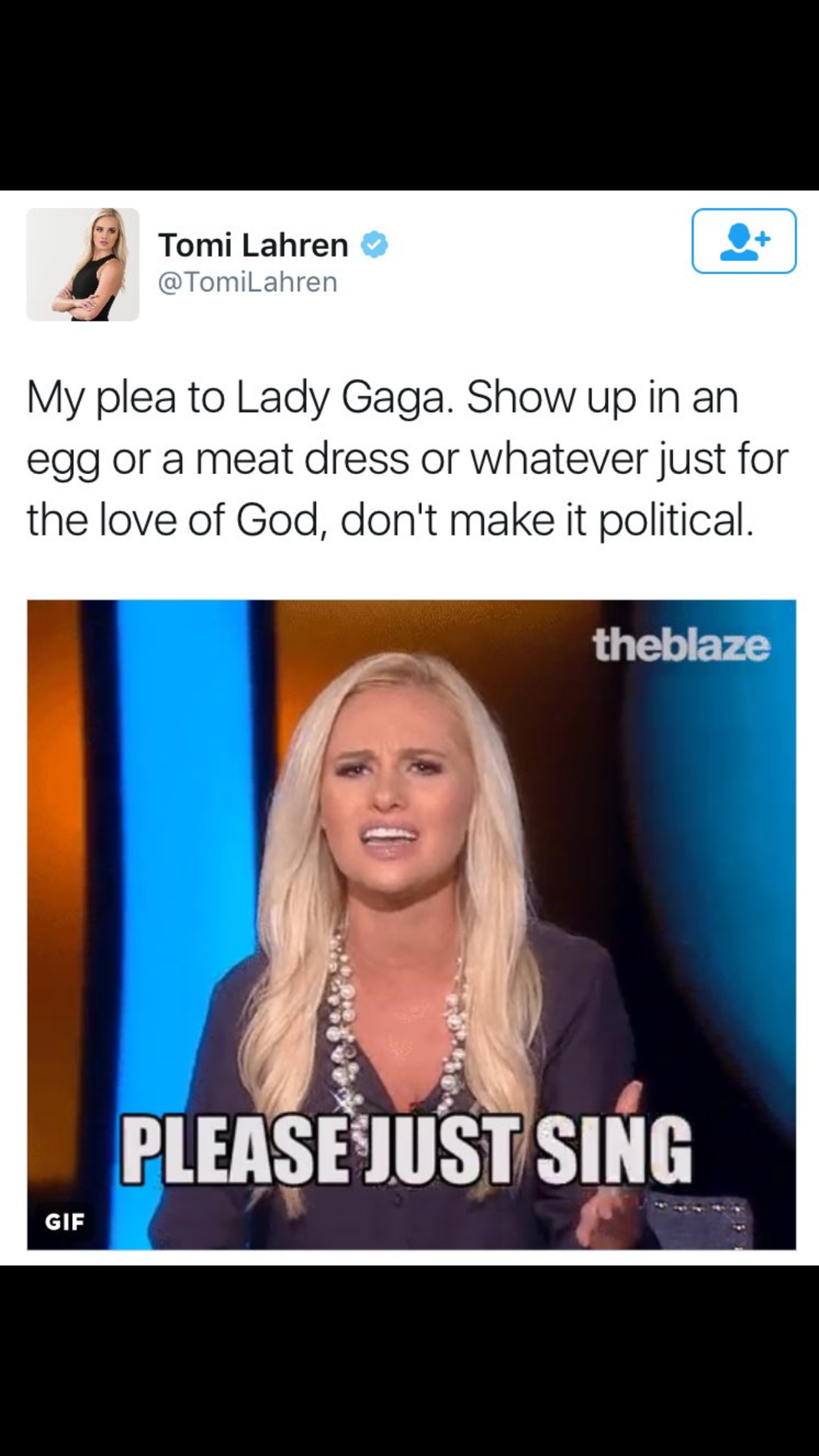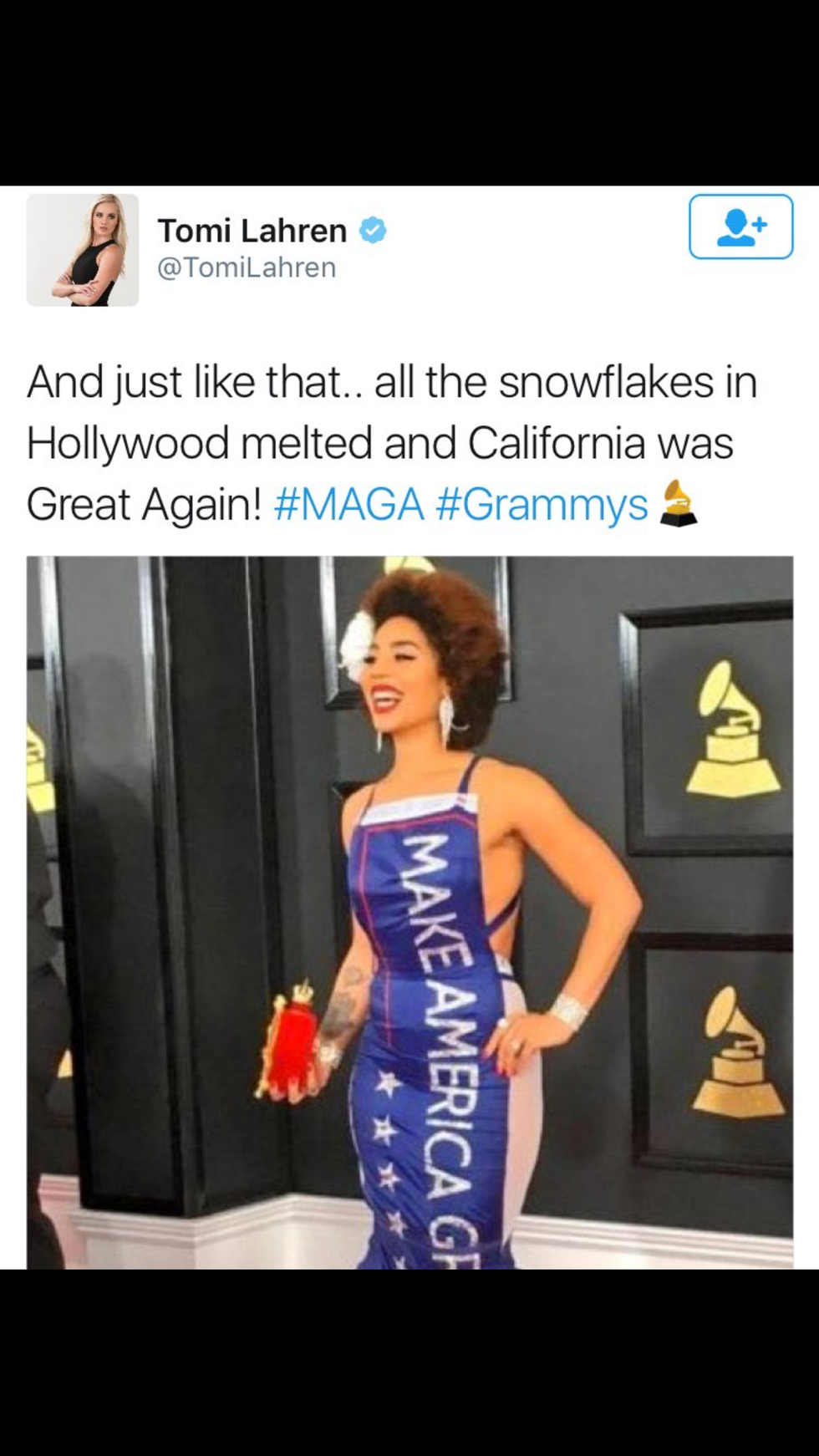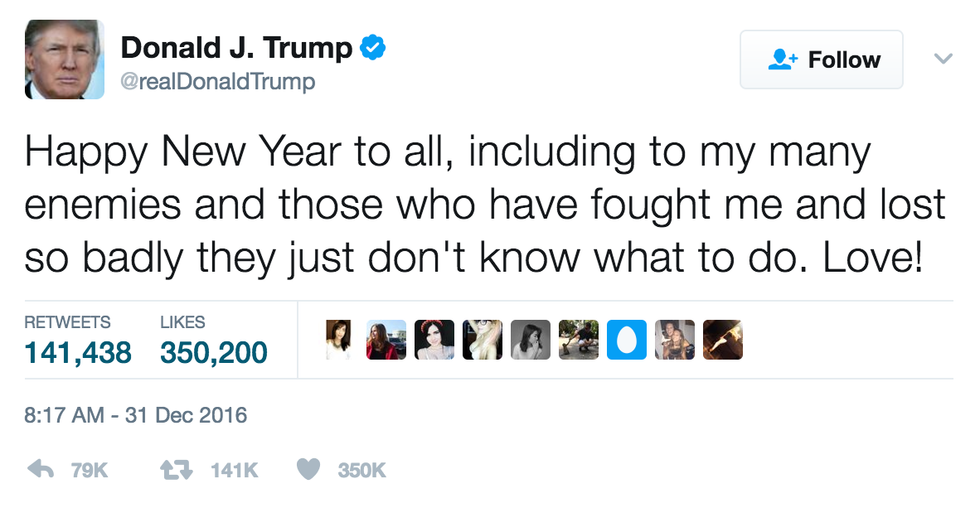Tuesday night, November 8th, 2016, 2:37 am, after hours of nail biting and eyes being glued to TV screens and phones across the nation, the 45th president of the United States was revealed to be Donald Trump. While many voters were overjoyed with the results, there was also quite a bit of backlash in the cool, fall air. Majority of this noticeable backlash stems from celebrities vocalizing their opinions of disappointment and lack of support towards the new man in the White House. There is a constant, never ending, back and forth debate of whether or not celebrities should use their platforms to be political amidst the new presidential election of 2016. One of, if not the biggest, contributor to this mainly pessimistic debate is social media. Social media, mainly Twitter, plays an especially large role in this debate because it is the number one source of communication between the two main stakeholder parties, celebrities and Donald Trump, displayed for the general public. The ability for the political remarks of celebrities and Trump’s tweets to be so public, highly influences people’s opinions as well as future voters, our sub stakeholder groups, whom either agree or disagree with the bold statements. This in turn could eventually shape the future of the government.
Making a remark on social media either towards the political party you identify with or against another is a very easy thing to do; it just happens to stay there forever. Statistically, more Republicans believe celebrities do not have a place in politics compared to Democrats (Left Of Center). Republicans, in turn, are not very consistent when addressing their disapproval of celebrities and their personal beliefs. After all, Donald Trump himself was a celebrity who got political and consequentially became the President of the United States. There is one, young, conservative name in the media constantly rolling off peoples’ tongues when addressing the back and forth mindset levied throughout the elephant party. That name is Tomi Lahren. Tomi Lahren is a 24-year-old American television and online video host, and a conservative political commentator with over 5 million followers across social media, rallying up 695,000 and growing on Twitter. She often refers to liberal celebrities who believe in things such as “illegal immigrants be[ing] able to get drivers licenses, instate tuition, and Obamacare” (The Blaze) as “snowflakes.” She thrives on telling celebrities to “not make it political,” via Twitter as seen in Figure 1 below, but when one does, such as B list singer, songwriter Joy Villa, she quickly takes to Twitter to vocalize how “great” it was. Villa is a singer who has attended the Grammy’s for the past three years and is known for her attention grabbing outfits. This past year, Villa wore a custom made “Make America Great Again” dress, obviously showing her support for Donald Trump. Lahren showing her support for Villa caused many other conservatives to support the singer, in fact her music sales skyrocketed after her bold outfit of choice for the Grammy’s. It is obvious Lahren’s over mixed message on celebrities getting political plus her high exposure level to conservatives deeply influences their opinions on what is “right and wrong” for a celebrity’s political disposition.
While Tomi Lahren has a high amount of exposure on social media regarding her political beliefs, our two main stakeholders have more. One would think Donald Trump has more volume and exposure to the public, being President of the United States, but celebrities are being more impactful and influential to the next generations of voters. Katy Perry, Paris Jackson, A Tribe Called Quest, and Lauren Jauregui of Fifth Harmony are just a few of the many highly influential names of celebrities against Donald Trump. Paris Jackson showed her solidarity with the DAPL protesters (Left Of Center). Tribe also spoke out against Trump’s Muslim ban and the general racism he sees promoted by Trump and his staff (Left Of Center). Katy Perry made it obvious she was With Her by performing at a couple of Hillary Clinton’s rallies. As of late, celebrities have been taking to platforms larger than Twitter to provide further insights to their beliefs and not be constrained by the 140 character limit on Twitter. Singer, songwriter and activist, Lauren Jauregui, even came out as a Cuban-American woman who identifies as bisexual in a public letter to Donald Trump via Billboard (Jauregui, Lauren), which she then shared on her social media where she has a mass total of over 7 million followers. When celebrities show solidarity in movements so bravely like this, it allows young LGBTQ voters and other future voters to know they have a safe haven in a time where they fear the future integrity of their rights. This in turn relates to the voters potentially voting democratically due to celebrity influence.
On the other hand, there are celebrities who have spoken out in accordance with Donald Trump. While they do show their full support for the President, they are less relevant compared to the celebrities against. These Trump supporting celebrities include names such as Kid Rock, Hulk Hogan, Willie Robertson, of Duck Dynasty, and a select few more (Oswald, Meryl Gottlieb, and Anjelica). To dive further, there are celebrities who believe celebrities should not be involved with politics, like Mark Wahlberg. He believes that A-listers are not on the same playing field as the common voter; “They might buy your CD or watch your movie, but you don’t put food on their table. You don’t pay their bills. A lot of Hollywood is living in a bubble. They’re pretty out of touch with the common person, the everyday guy out there providing for their family,” with which he backed up his point. Continued, it is obvious more celebrities are against President Donald Trump than for, with obvious numeral differences in headlines, too, as seen in Figures 3 and 4. While the B List Celebrity Factor is valid, it is not nearly as influential to the voter stakeholder groups who majority do not even know the names of the celebrities endorsing Trump.
On Twitter and other social media sources, our two main stakeholder groups have large presences. In comparison to previous presidents and their social media statements, Donald Trump tends to be more impromptu in his tweets, often times lacking the poise the President of the United States should possess. Celebrities are quick to point it out, too. In celebration of New Year’s, Donald Trump sent out a tweet with a back handed compliment. In comparison to Barrack Obama sending out a tweet praising the American people working together as a team (Murphy, Mike), it is easy for a young, influential voter to recognize the levels of lack in maturity. This incident, of many, was quickly trolled by celebrities responding in sarcastic ways.
Sources
The Blaze. "What Does It Mean to Be a Snowflake?" TheBlaze. TheBlaze, 10 Jan. 2017. Web. 16 Apr. 2017.
Friedersdorf, Conor. "The Absurdity of Attacking Celebrities to Defend Donald Trump." The Atlantic. Atlantic Media Company, 10 Jan. 2017. Web. 21 Feb. 2017.
Izadi, Elahe, and Amy B. Wang. "Meryl Streep Called out Donald Trump at the Golden Globes. He Responded by Calling Her ‘over-rated.’." The Washington Post. WP Company, 09 Jan. 2017. Web. 21 Feb. 2017.
Jauregui, Lauren. "Fifth Harmony's Lauren Jauregui Pens Open Letter to Donald Trump Voters: 'I Am a Bisexual Cuban-American Woman & I Am So Proud of It'." Billboard. Billboard, 18 Nov. 2016. Web. 21 Feb. 2017.
Left Of Center. "Right-Wingers Disapprove Of Celebrities Getting Political Unless They're Pro-Trump." Crooks and Liars. N.p., n.d. Web. 21 Feb. 2017.
Lynch, Meryl Gottlieb and John. "41 Celebrities Who Are Taking a Strong Stand against Donald Trump." Business Insider. Business Insider, 14 Oct. 2016. Web. 21 Feb. 2017.
Marquina, Sierra. "Mark Wahlberg: Why Celebrities Should Never Talk Politics." Business Insider. Business Insider, 03 Dec. 2016. Web. 21 Feb. 2017.
Murphy, Mike. "Two Presidential New Year's Tweets, Two Vastly Different Messages." MarketWatch. N.p., 01 Jan. 2017. Web. 19 Mar. 2017.
Oswald, Meryl Gottlieb and Anjelica. "29 Celebrities Who Love and Endorse Donald Trump." Business Insider. Business Insider, 08 Nov. 2016. Web. 21 Feb. 2017.

























